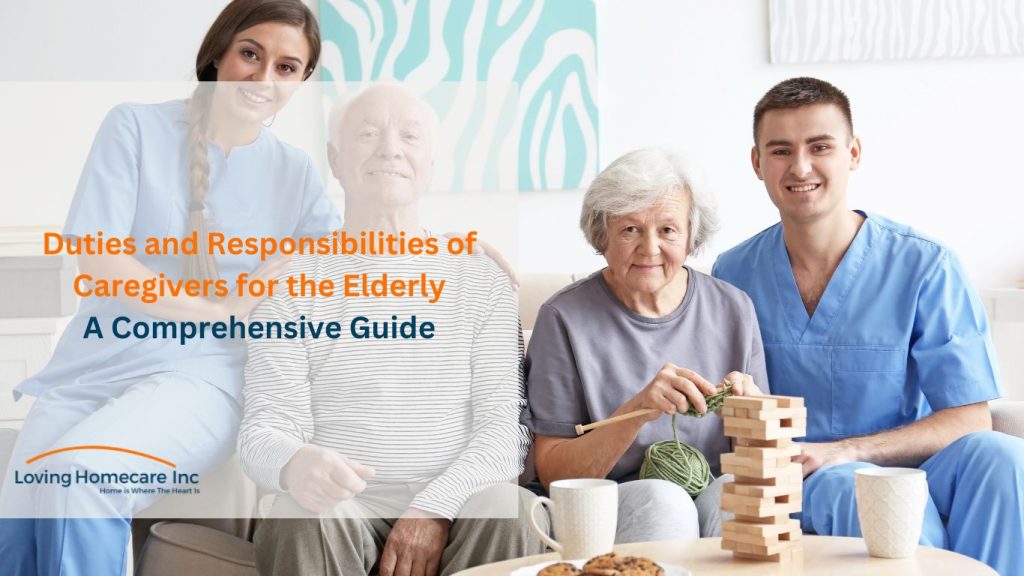Recently updated on January 20th, 2026 at 02:03 pm
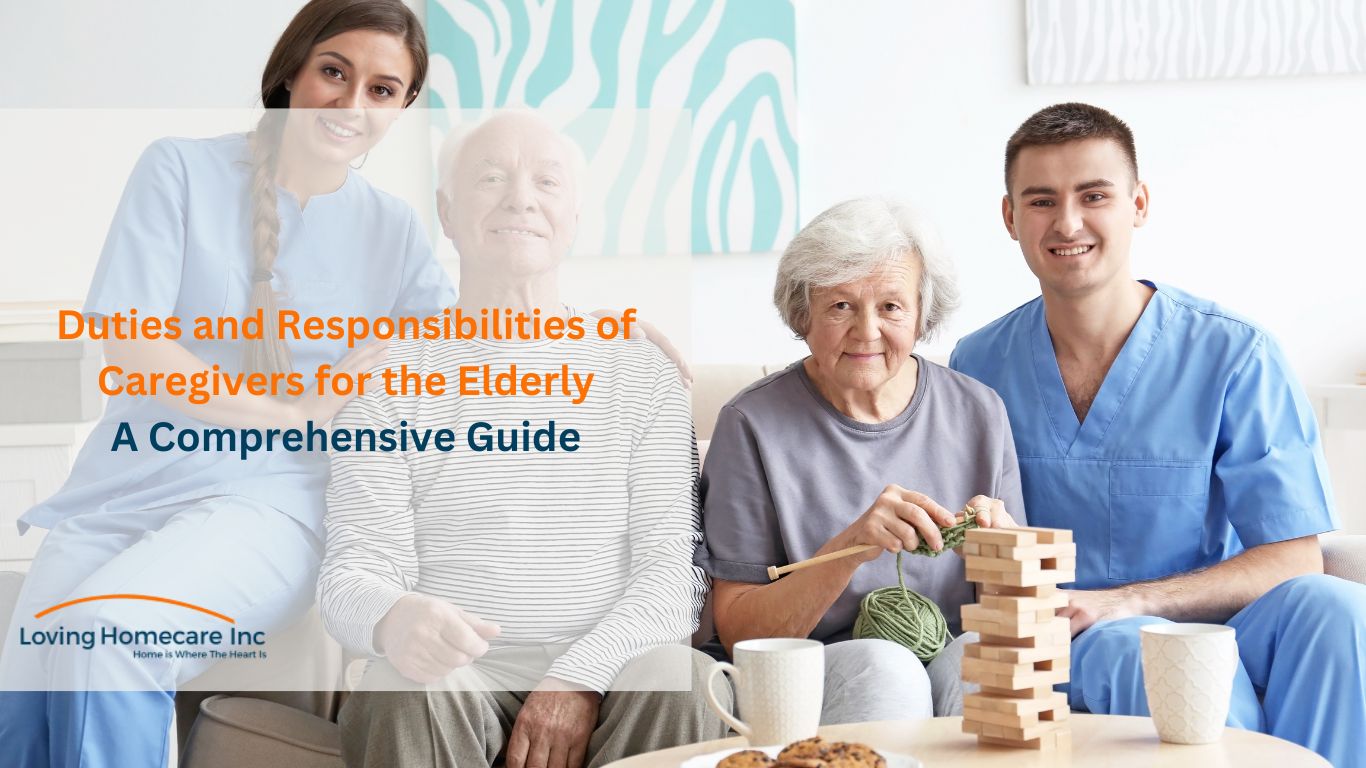
Caring for the elderly is a deeply rewarding yet complex role that demands a broad spectrum of responsibilities to ensure their comprehensive well-being, comfort, and respect. As individuals age, their needs evolve, often increasing their dependence on others for assistance with daily activities, healthcare management, and emotional support.
The role of a caregiver, whether as a professional aide, family member, or friend, becomes crucial in addressing these varied needs. This article aims to highlight seventeen vital caregiver duties and responsibilities to offer effective support to the elderly. These responsibilities span from personal care to emotional companionship, each playing a pivotal role in enriching the lives of the elderly, ensuring they receive the care and dignity they deserve.
Understanding the Role of a Caregiver
Before diving into the specific duties, it’s crucial to grasp the caregiver’s role in an elderly person’s life. Caregivers act as the primary support, often becoming the bridge between the elderly and their access to a comfortable life. This role requires patience, empathy, and a deep understanding of the elderly’s needs.
Personal Care Assistance
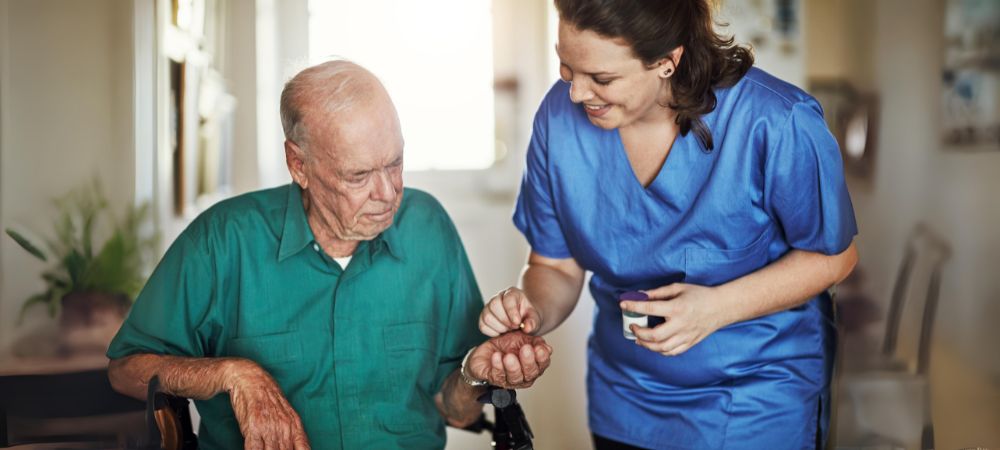
Assisting with personal care stands as a cornerstone in the caregiving role, addressing the basic yet vital needs of the elderly. This encompasses assistance with bathing, grooming, and dressing activities, which may become challenging as individuals age.
Beyond the obvious benefits to physical health, such as preventing infections and maintaining skin integrity, personal care significantly impacts the emotional well-being of the elderly. It boosts self-esteem and promotes a sense of dignity and happiness by allowing them to maintain their personal appearance.
Caregivers play a sensitive role here, offering support that respects the individual’s privacy and preferences, fostering a trust-based relationship that enhances the overall caregiving experience.
Medication Management
Medication management is a critical responsibility, requiring meticulous attention to ensure the elderly’s health and safety.
Caregivers are tasked with organizing medication schedules, ensuring doses are taken accurately and on time, often supported by AI-driven reminders, smart pill dispensers, and telehealth consultations. This role extends beyond mere reminder services; it involves understanding each medication’s purpose, potential side effects, and interactions, while leveraging technology to enhance adherence and safety.
By effectively managing this aspect of care, caregivers help prevent the complications associated with medication errors, such as adverse reactions or hospitalizations. Their involvement is crucial in bridging communication between healthcare providers and the elderly, ensuring any concerns or changes in medication regimes are promptly addressed. It is crucial part of giving specialized care.
Nutritional Support
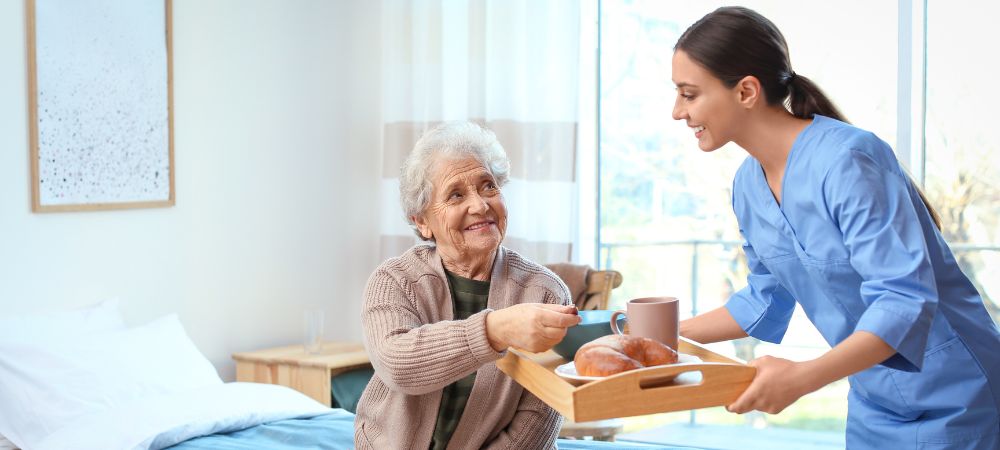
Nutritional support is pivotal in maintaining the elderly’s health, addressing specific dietary needs and preferences to enhance their quality of life. As appetite and the ability to prepare meals may decline with age, caregivers play an essential role in ensuring the provision of well-balanced, nutritious meals. This includes meal planning, preparation, and assistance with eating if needed. Proper nutrition supports physical health, aids in the management of chronic conditions, and promotes mental well-being.
Caregivers must also stay vigilant for signs of malnutrition or dehydration, common issues that can significantly impact the elderly’s health, adjusting meal plans as necessary to meet their evolving needs. Negligence can lead to end of life care at home.
Mobility Assistance
Mobility assistance is a fundamental part of caregiving, addressing the physical challenges that the elderly may face. This support encompasses aiding in walking, transferring from bed to chair, and navigating within the home or during outings.
By providing this assistance, caregivers play a crucial role in preventing falls—a common risk for the elderly that can lead to significant injuries. Moreover, mobility support is not just about physical aid; it also empowers the elderly to maintain a level of independence and confidence in their daily activities, enhancing their quality of life and well-being.
Emerging technologies such as assistive robotics and smart mobility aids are now integrated into care, providing physical support and fall prevention while promoting independence through advanced devices that adapt to individual needs.
Transportation and Errands
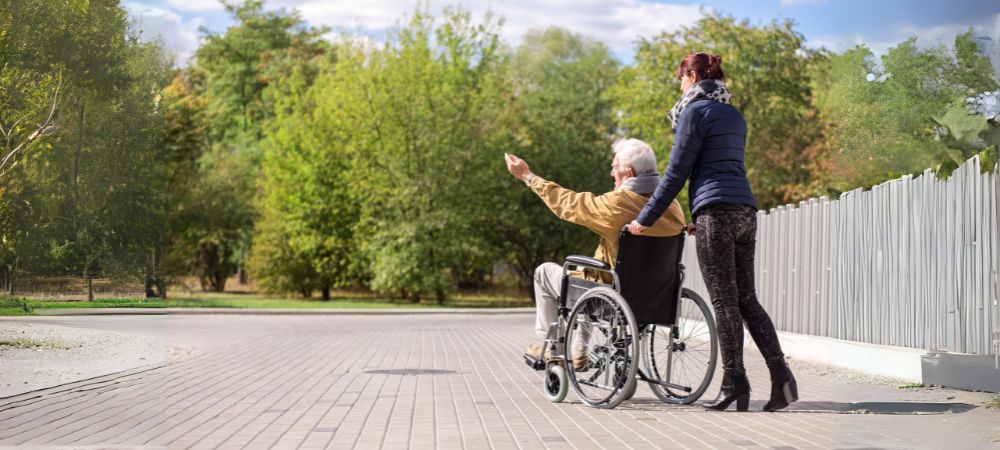
The responsibility of managing transportation and running errands is essential in keeping the elderly connected with the outside world. Caregivers often take on the task of driving to doctor’s appointments, shopping for groceries, and completing other essential errands. This not only ensures that the elderly meet their health care and nutritional needs but also helps maintain their social connections and engagement with the community. It is a critical support system that fosters independence while ensuring safety and access to necessary services and activities.
Health Monitoring
Regular health monitoring is crucial in the caregiving process, enabling the early detection and management of potential health issues through wearable devices like smartwatches and remote patient monitoring systems. Caregivers must be vigilant in observing any signs of deteriorating health or the emergence of new symptoms, supported by real-time data that alerts them to changes. This involves keeping track of vital signs, medication effects, and overall well-being, facilitating timely interventions.
Prompt communication with healthcare professionals about any changes is essential to adjust care plans or treatments as needed. Effective health monitoring can significantly impact the elderly’s health outcomes, ensuring timely interventions and ongoing management of chronic conditions. When needed, arrange safe transportation for seniors.
In today’s care landscape, telemedicine plays a crucial role, enabling remote consultations and digital health monitoring that reduce the need for physical travel. This innovation supports timely medical interventions and continuous care, especially for seniors with mobility issues or those living in remote areas.
Emotional Support and Companionship
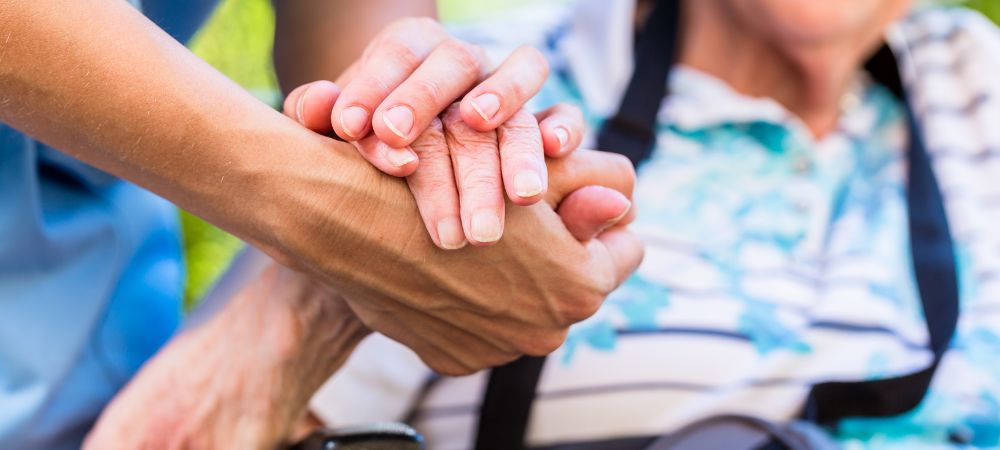
Emotional support and companionship are vital components of holistic elderly care. The presence of a caregiver offers much more than physical assistance; it provides valuable social interaction and emotional connection, often supplemented by digital platforms that facilitate virtual social activities and companion matching. Engaging in meaningful conversations, participating in shared activities, or simply being there to listen can greatly enrich the elderly’s mental and emotional well-being, combating loneliness through both personal and technological means.
This companionship combats loneliness and depression, fostering a sense of belonging and happiness. The caregiver’s role as a confidant and friend is indispensable in promoting the overall health and happiness of the elderly.
Home Safety Management
Ensuring a safe living environment is paramount in caring for the elderly. Caregivers are tasked with identifying and mitigating potential hazards, often utilizing smart home technology such as automated lighting, motion sensors, and security systems to prevent falls and accidents. This might involve rearranging furniture to create clear pathways, installing grab bars in bathrooms, and ensuring that emergency systems are in place and functional, enhanced by technology for proactive safety.
Regular maintenance and cleanliness of the living space also contribute to preventing accidents and health issues. By proactively managing home safety, caregivers help create a secure and comfortable environment that supports the elderly’s independence and well-being.
Communication with Healthcare Professionals

Effective communication with healthcare professionals is a vital role of caregivers, acting as a bridge between the elderly and their medical teams. This involves accurately conveying health concerns, changes in condition, and any response to treatments from the elderly to their doctors.
Caregivers also ensure that healthcare instructions are clearly understood and followed, playing a crucial part in the continuity of care. This responsibility includes scheduling appointments, relaying information from medical appointments back to the elderly, and advocating for their needs. By maintaining open lines of communication, caregivers help optimize health outcomes and ensure that the care provided aligns with the elderly’s health goals.
Support with Financial Management
Assisting with financial management is another important aspect of caregiving, particularly as some elderly individuals may struggle with the complexities of budgeting, bill payments, and financial planning.
Caregivers may help by organizing financial documents, ensuring bills are paid on time, and monitoring expenses to adhere to a budget. This assistance also extends to safeguarding the elderly from financial scams and abuse, a growing concern in today’s society. By overseeing these financial tasks, caregivers provide invaluable support, helping to maintain the elderly’s financial health and peace of mind.
Activity Planning
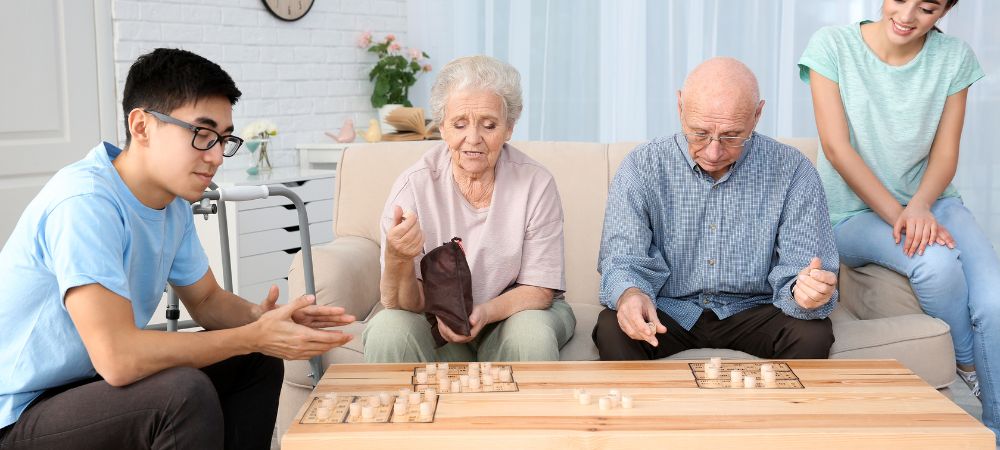
Activity planning is essential for keeping the elderly engaged and stimulated, both mentally and physically. Caregivers play a key role in identifying and organizing activities, often using AI to personalize routines and cognitive stimulation programs based on individual interests and abilities. This includes light exercise, arts and crafts, reading, or social outings, enhanced by technology to promote cognitive health and emotional well-being.
These activities not only enrich the daily life of the elderly but also promote cognitive health, physical fitness, and emotional well-being. By facilitating participation in these activities, caregivers contribute to a more vibrant and fulfilling lifestyle for the elderly, fostering a sense of purpose and joy in their day-to-day lives.
Assisting with Pet Care
For elderly pet owners, pets provide companionship and joy, but managing pet care can become challenging. Caregivers may assist with various aspects of pet care, including feeding, walking, and ensuring the pet receives timely veterinary care. This support ensures that the elderly can continue to enjoy the benefits of pet ownership without the stress of managing all aspects of pet care.
Additionally, assisting with pet care helps maintain a healthy and safe environment for both the elderly and their pets, reinforcing the therapeutic bond that pets often provide to their owners.
Handling Household Chores
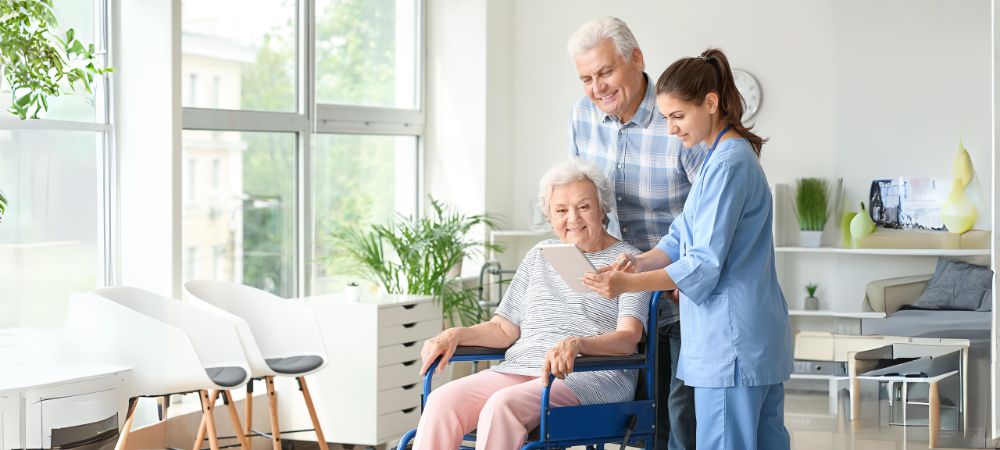
Handling household chores is a crucial aspect of caregiving that contributes significantly to creating a safe and pleasant living environment for the elderly. This duty encompasses a wide range of tasks such as cleaning, doing the laundry, making minor repairs, and ensuring the home is organized and clutter-free.
These chores not only maintain hygiene and prevent the accumulation of dust and germs but also create a serene and orderly space that supports the elderly’s mental and emotional well-being. By taking on these responsibilities, caregivers relieve the elderly of the physical strain and stress associated with household maintenance, allowing them to live more comfortably and independently.
Managing Medical Appointments
Caregivers play a vital role in managing medical appointments, ensuring that the elderly have access to necessary healthcare services without the stress of handling logistics. This responsibility includes scheduling appointments, organizing transportation to and from healthcare facilities, and sometimes accompanying the elderly to these visits.
Effective management of medical appointments ensures that the elderly do not miss critical check-ups and treatments, facilitating ongoing health monitoring and timely intervention for any health issues. This proactive approach to healthcare coordination is essential for maintaining the overall health and wellness of the elderly.
Providing Respite for Family Members

Providing respite for family members is an invaluable service offered by caregivers, giving family caregivers the opportunity to take a break and recharge, often supported by digital platforms that connect them with professional assistance, educational resources, and peer networks to reduce burnout.
This support is crucial for maintaining the well-being of family caregivers, who may be at risk of burnout from the continuous demands of caregiving.
Respite care allows family members to attend to personal matters, rest, or engage in self-care, with the assurance that their loved one is in capable and compassionate hands. This break can help sustain the family caregiver’s health and well-being, ensuring they can continue to provide care over the long term with renewed energy and perspective.
Advocating for the Elderly’s Needs
Advocating for the elderly involves standing up for their rights, preferences, and needs in various situations, particularly in healthcare settings and within family discussions. This role is critical as it ensures that the elderly’s voice is heard and their well-being is prioritized.
Caregivers must navigate conversations with doctors, nurses, and family members to ensure that the care plans reflect the elderly’s wishes and health requirements. By being an advocate, caregivers safeguard the dignity and autonomy of the elderly, making sure they receive respectful treatment and that their decisions regarding their own care are respected and followed.
Continuous Learning
Continuous learning is essential for caregivers to provide the highest quality of care to the elderly. The field of elderly care is constantly evolving, with rapid advancements in technology, regulations, and best practices, requiring ongoing education in smart home devices, AI tools, and telehealth to stay current.
Caregivers must stay updated on these developments to ensure their care practices are based on the latest evidence and best practices. This might involve participating in workshops, courses, or reading up on recent studies and trends in geriatric care. By committing to ongoing education, caregivers enhance their skills and knowledge, ensuring they can meet the diverse and changing needs of the elderly effectively and compassionately.
Conclusion
The role of a caregiver is indeed multifaceted, requiring a diverse set of skills and qualities to provide comprehensive support to the elderly. By embracing and fulfilling the seventeen duties and responsibilities outlined in this article, caregivers can profoundly impact the quality of life of the elderly, ensuring they experience their later years with dignity, comfort, and happiness. While caregiving poses its challenges, the fulfillment and rewards it brings are immeasurable, knowing that one is making a meaningful difference in someone’s life.
To ensure your loved ones receive the best possible care, consider reaching out to Loving Homecare. Our dedicated team is committed to providing compassionate and professional caregiving services tailored to meet the unique needs of each individual. Contact us today to learn more and avail of our exceptional caregiving services.

